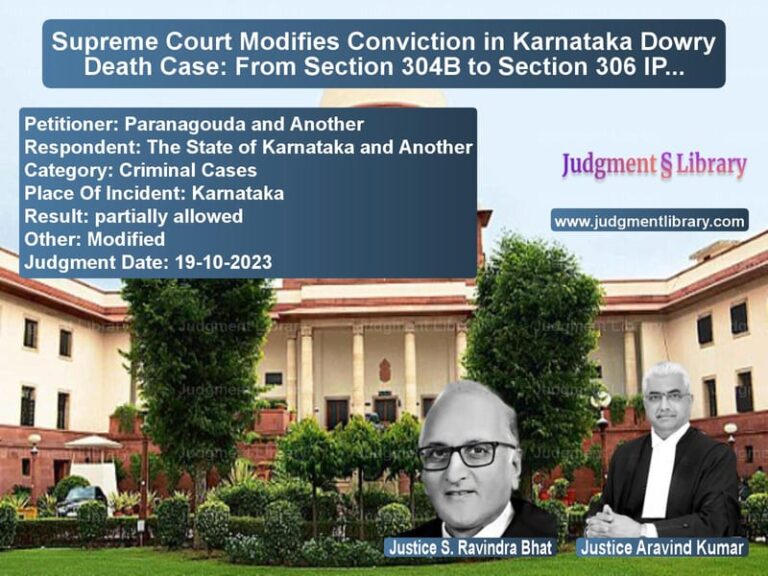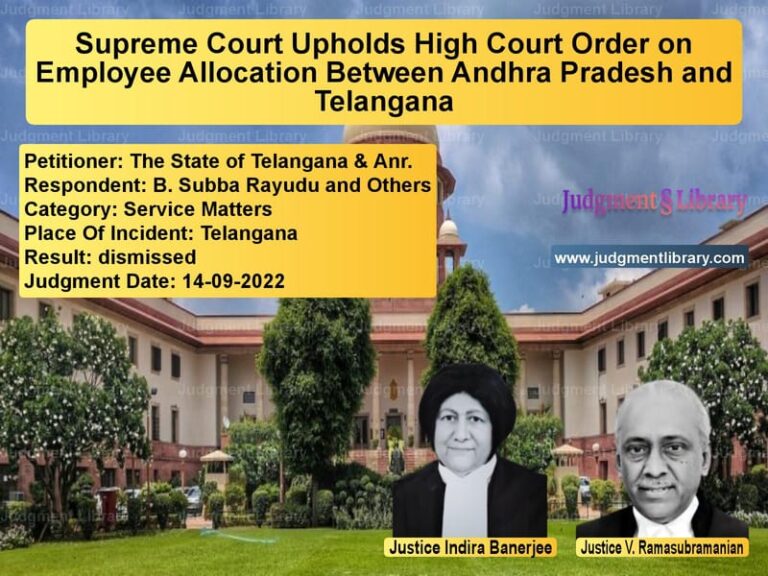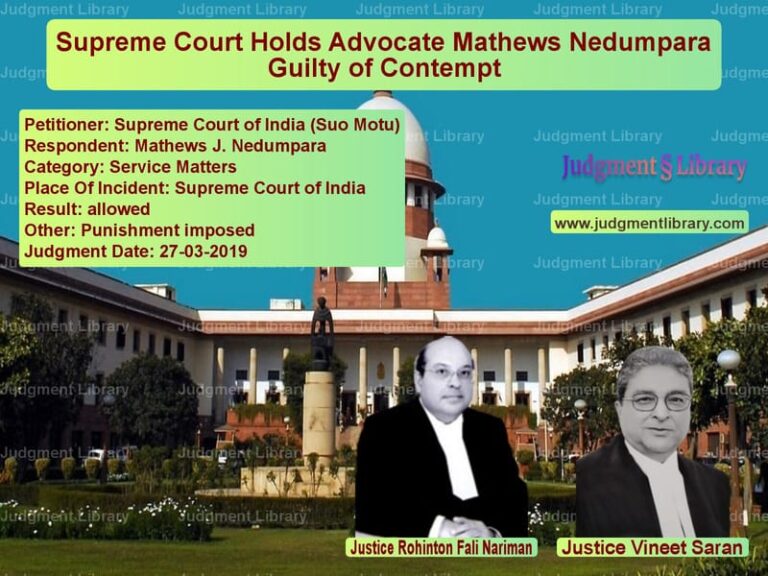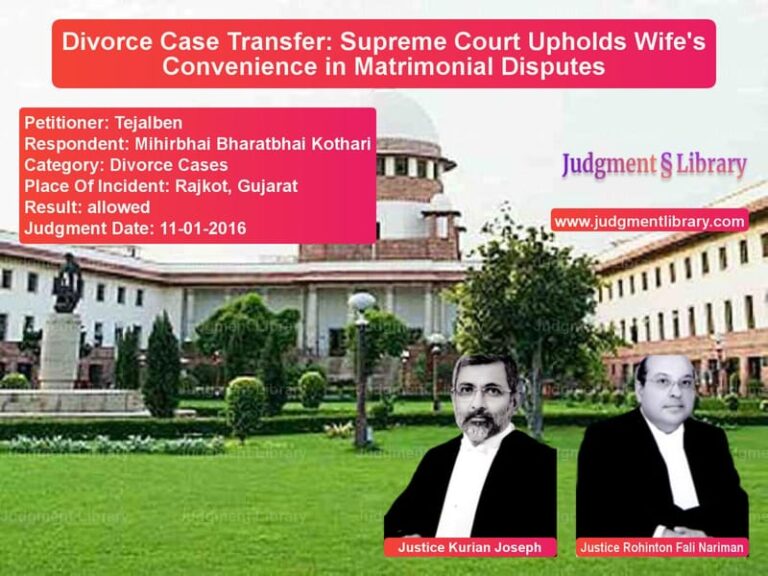Supreme Court Directs Political Parties to Disclose Criminal Records of Candidates
The case of Rambabu Singh Thakur v. Sunil Arora & Ors. deals with the critical issue of criminalization of politics in India. The Supreme Court examined whether political parties were complying with previous directions mandating disclosure of candidates’ criminal backgrounds and issued stricter guidelines to ensure voter awareness. This judgment reinforces the need for transparency and accountability in the electoral process.
Background of the Case
The matter arose from the Supreme Court’s 2018 ruling in Public Interest Foundation & Ors. v. Union of India & Anr., where the Court issued guidelines to political parties requiring them to disclose the criminal antecedents of candidates. Despite these directions, data showed an alarming increase in the number of Members of Parliament (MPs) with criminal cases:
- In 2004, 24% of MPs had criminal cases pending.
- In 2009, this increased to 30%.
- In 2014, it further rose to 34%.
- By 2019, as many as 43% of MPs had pending criminal cases.
The petitioners approached the Supreme Court, highlighting non-compliance with the earlier directives and seeking stricter enforcement measures.
Legal Issues Involved
- Whether political parties were complying with the Supreme Court’s 2018 directives.
- Whether additional measures were needed to ensure disclosure of candidates’ criminal backgrounds.
- Whether failure to disclose criminal records amounted to contempt of court.
- Whether “winnability” of a candidate could be cited as justification for selecting candidates with criminal records.
Petitioners’ Arguments
The petitioners, led by Rambabu Singh Thakur, contended:
- Political parties were deliberately ignoring the Supreme Court’s directions by failing to disclose candidates’ criminal records adequately.
- Voters had the fundamental right to know about candidates’ criminal backgrounds before making an informed decision.
- Parties continued to field candidates with serious criminal cases, using “winnability” as an excuse.
- The Election Commission had failed to take strong action against non-compliance.
Respondents’ Arguments
The Election Commission and political parties countered:
- They had taken steps to ensure compliance, including mandating candidates to file affidavits disclosing criminal cases.
- Existing disclosure requirements were sufficient, and no further judicial intervention was necessary.
- Political parties had the discretion to select candidates, and courts should not interfere in this domain.
Supreme Court’s Analysis
The Supreme Court observed that political parties had failed to comply with its 2018 directions and that the problem of criminalization in politics was worsening. Key findings included:
- Disclosure mechanisms were ineffective due to lack of publicity.
- Political parties were citing “winnability” as the sole factor for selecting candidates with criminal backgrounds.
- Voter awareness was still low due to inadequate dissemination of information.
Final Judgment
The Supreme Court issued strict new guidelines:
- Political parties must publish details of candidates with criminal records on their website, social media platforms (Facebook & Twitter), and in at least one national and one local newspaper.
- Parties must explain why a candidate with a criminal record was selected over a clean candidate.
- Justification based solely on “winnability” would not be accepted.
- These disclosures must be made within 48 hours of candidate selection or two weeks before nomination, whichever is earlier.
- Political parties must submit compliance reports to the Election Commission within 72 hours of candidate selection.
- The Election Commission must report non-compliance to the Supreme Court as contempt of court.
Impact of the Judgment
This ruling has significant implications for electoral transparency and democracy:
- It ensures that voters receive complete information about candidates’ criminal records.
- It prevents parties from justifying criminal candidates based on “winnability.”
- It mandates strict timelines for disclosure, preventing last-minute information suppression.
- It strengthens the Election Commission’s role in enforcing electoral transparency.
- It holds political parties accountable by treating non-compliance as contempt of court.
By enforcing stricter guidelines, the Supreme Court has taken a decisive step toward curbing the criminalization of politics and ensuring a more transparent electoral process.
Petitioner Name: Rambabu Singh Thakur.Respondent Name: Sunil Arora & Ors..Judgment By: Justice R.F. Nariman, Justice S. Ravindra Bhat.Place Of Incident: India.Judgment Date: 13-02-2020.
Don’t miss out on the full details! Download the complete judgment in PDF format below and gain valuable insights instantly!
Download Judgment: Rambabu Singh Thakur vs Sunil Arora & Ors. Supreme Court of India Judgment Dated 13-02-2020.pdf
Direct Downlaod Judgment: Direct downlaod this Judgment
See all petitions in Public Interest Litigation
See all petitions in Legislative Powers
See all petitions in Judgment by Rohinton Fali Nariman
See all petitions in Judgment by S Ravindra Bhat
See all petitions in allowed
See all petitions in Modified
See all petitions in supreme court of India judgments February 2020
See all petitions in 2020 judgments
See all posts in Election and Political Cases Category
See all allowed petitions in Election and Political Cases Category
See all Dismissed petitions in Election and Political Cases Category
See all partially allowed petitions in Election and Political Cases Category







